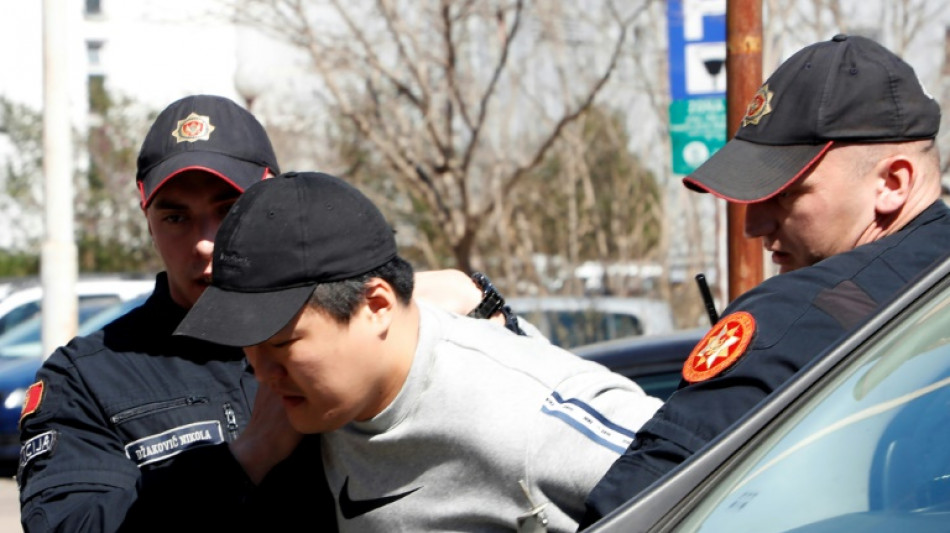
-
 Poppies flourish at Tower of London for WWII anniversary
Poppies flourish at Tower of London for WWII anniversary
-
US economy unexpectedly shrinks on import surge before Trump tariffs
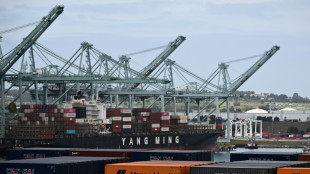
-
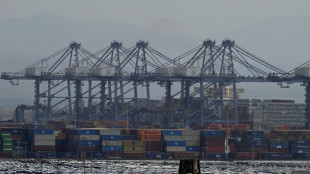 Stocks drop after US economy contracts amid tariffs turmoil
Stocks drop after US economy contracts amid tariffs turmoil
-
US economy unexpectedly shrinks on import surge ahead of Trump tariffs
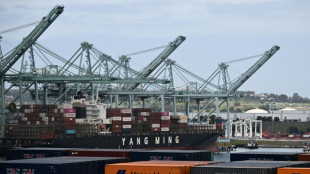
-
 Dravid says Suryavanshi, 14, needs support from fame
Dravid says Suryavanshi, 14, needs support from fame
-
Arsenal can win 'anywhere' says Merino after Champions League defeat by PSG

-
 Bangladesh crush Zimbabwe by an innings in second Test
Bangladesh crush Zimbabwe by an innings in second Test
-
Swiatek recovers against Keys to reach Madrid Open semis

-
 Spurs captain Son out of first leg of Europa League semi-final
Spurs captain Son out of first leg of Europa League semi-final
-
US economy unexpectedly shrinks in first three months of Trump presidency
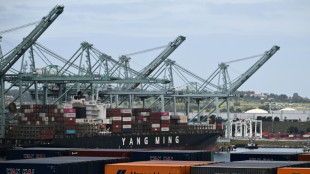
-
 India to ask caste status in next census for first time in decades
India to ask caste status in next census for first time in decades
-
Burkina junta rallies supporters after claimed coup 'plot'
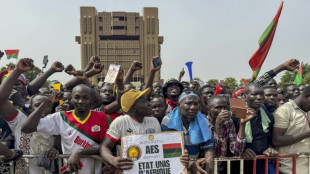
-
 Forest owner Marinakis steps back as European qualification looms
Forest owner Marinakis steps back as European qualification looms
-
US economy unexpectedly contracts in first three months of Trump presidency
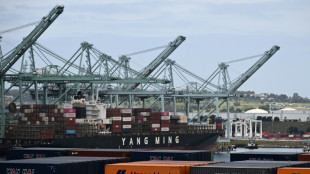
-
 Bilbao will give 'soul' to beat Man United: Nico Williams
Bilbao will give 'soul' to beat Man United: Nico Williams
-
Sweden arrests teen after triple killing

-
 Pakistan says India planning strike after deadly Kashmir attack
Pakistan says India planning strike after deadly Kashmir attack
-
Cardinals lay groundwork for conclave, hope for quick vote
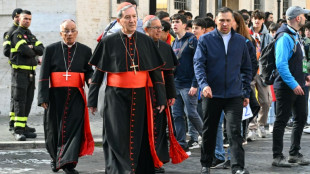
-
 More automakers drop earnings guidance over tariffs
More automakers drop earnings guidance over tariffs
-
William and Kate release romantic image on low-key anniversary

-
 Israel says strikes Syria to shield Druze as clashes spread
Israel says strikes Syria to shield Druze as clashes spread
-
Champions Cup format 'not perfect' says EPCR boss

-
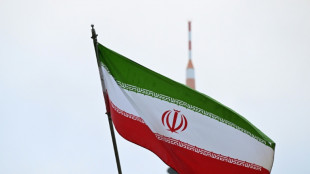 Iran hangs man as Israeli spy after 'unfair' trial: activists
Iran hangs man as Israeli spy after 'unfair' trial: activists
-
Stock markets mostly rise ahead of US economic data, tech earnings
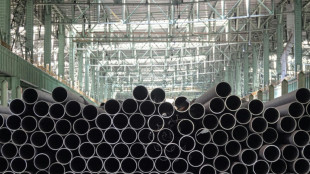
-
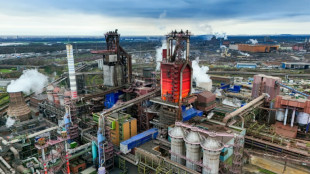 German growth better than expected but tariff turmoil looms
German growth better than expected but tariff turmoil looms
-
Sinner denies beneficial treatment in doping scandal ahead of Rome return

-
 Eurozone economy grows more than expected despite US tariff turmoil
Eurozone economy grows more than expected despite US tariff turmoil
-
Toulouse hooker Mauvaka out of Champions Cup semi

-
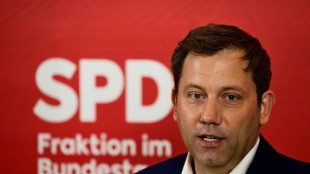 Germany's next finance minister, 'bridge-builder' Lars Klingbeil
Germany's next finance minister, 'bridge-builder' Lars Klingbeil
-
Mehidy century puts Bangladesh in command against Zimbabwe

-
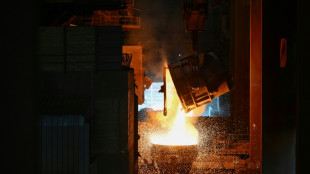 Steelmaker ArcelorMittal warns of uncertainty
Steelmaker ArcelorMittal warns of uncertainty
-
Vietnam's Gen-Z captivated by 50-year-old military victory

-
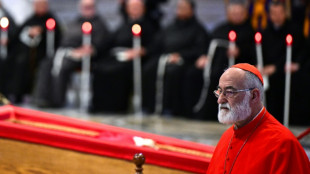 Moroccan-based cardinal says Church does not need Francis 'impersonator'
Moroccan-based cardinal says Church does not need Francis 'impersonator'
-
US official tells UN top court 'serious concerns' over UNRWA impartiality

-
 Jeep owner Stellantis suspends outlook over tariffs
Jeep owner Stellantis suspends outlook over tariffs
-
New Zealand, Phillippines sign troops deal in 'deteriorating' strategic environment

-
 Aston Martin limits US car imports due to tariffs
Aston Martin limits US car imports due to tariffs
-
Pakistan says India planning strike as tensions soar over Kashmir

-
 Australian triple-murder suspect allegedly cooked 'special' mushroom meal
Australian triple-murder suspect allegedly cooked 'special' mushroom meal
-
Most stock markets rise despite China data, eyes on US reports
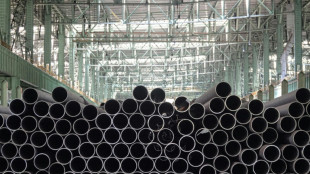
-
 TotalEnergies profits drop as prices slide
TotalEnergies profits drop as prices slide
-
Volkswagen says tariffs will dampen business as profit plunges

-
 Jeep owner Stellantis suspends 2025 earnings forecast over tariffs
Jeep owner Stellantis suspends 2025 earnings forecast over tariffs
-
China's Shenzhou-19 astronauts return to Earth
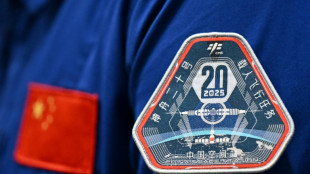
-
 French economy returns to thin growth in first quarter
French economy returns to thin growth in first quarter
-
Ex-Premier League star Li Tie loses appeal in 20-year bribery sentence
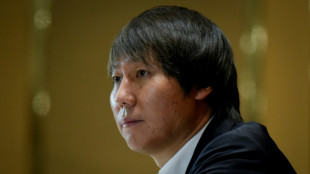
-
 Belgium's green light for red light workers
Belgium's green light for red light workers
-
Haliburton leads comeback as Pacers advance, Celtics clinch

-
 Rahm out to break 2025 win drought ahead of US PGA Championship
Rahm out to break 2025 win drought ahead of US PGA Championship
-
Japan tariff envoy departs for round two of US talks


Do Kwon: S. Korea's crypto 'genius' turned disgraced fugitive
Once hailed as a genius, South Korean entrepreneur Do Kwon -- now facing multiple criminal charges over his failed cryptocurrency -- was a brash industry figure whose fame disintegrated into global notoriety.
After months on the run, the 31-year-old, whose full name is Kwon Do-hyung, was arrested Thursday in Montenegro after being caught trying to catch a flight using fake Costa Rican travel documents.
He is accused of fraud over the dramatic implosion last year of his company Terraform Labs, which wiped out about $40 billion of investors' money and shook global crypto markets.
Immediately after his arrest the United States hit him with a slew of charges over what they called a "multi-billion-dollar crypto asset securities fraud" and South Korea, where he faces separate charges, said it wants to extradite him.
The cryptocurrency he created, an "algorithmic stablecoin" called Terra, was in reality a glorified Ponzi scheme, experts say.
Yet as recently as March 2022, Kwon was being described in glowing South Korean media reports as a "genius" as thousands of private investors lined up to pour cash into his company.
"Kwon and his story are a product of our times," Cho Dong-keun, an economics professor emeritus at Myongji University, told AFP.
"He knew how to win the hearts of those who so desperately wanted to make a fortune in one stroke. He also knew how to exploit their anxiety and turn it into massive profits."
- Elite connections -
Born in 1991, Kwon attended South Korea's elite Daewon Foreign Language High School where, according to a book he wrote about his school days, he founded an English-language student paper and competed in various English debating championships.
He went on to major in computer science at Stanford University in the US, and reportedly interned at Apple and Microsoft before returning to Asia to start his own business.
In 2018, he co-founded Terraform Labs with Daniel Shin -- who is linked to South Korea's elite Samsung family through his uncle -- and developed the TerraUSD and Luna currencies.
He quickly rose to fame, partly thanks to Shin's connections, successfully branding himself as a young industry luminary.
TerraUSD was marketed as a "stablecoin", a type of cryptocurrency which is typically pegged to stable assets such as the US dollar to prevent drastic price fluctuations.
In 2019, he featured in Forbes' 30 under 30 Asia list.
Forbes wrote that Kwon's "price-stable cryptocurrency, or stablecoin, attracted 40 million users to work with the company at launch in January 2018".
"With the aim of building a blockchain-based payment system, Terra has raised $32 million from crypto-giants such as Binance," it said.
- 'S Korean Elizabeth Holmes' -
But experts had long warned Kwon's model was fundamentally flawed, with some outright calling it a Ponzi scheme.
Unlike other stablecoins backed by real-world assets such as cash or gold, TerraUSD was algorithmic -- pegged only to sister currency Luna, using maths and incentive mechanisms to maintain their peg.
"Algorithmic stablecoins like Terra/Luna were doomed from the very beginning," Christian Catalini, founder of MIT's Cryptoeconomics Lab, told AFP.
"Things can work for a while, while the ecosystem is growing, but are destined to run into a death spiral at some point."
A full investigation of Kwon should help clarify what happened when Terra/Luna collapsed, he said, adding this was necessary to improve the crypto industry as a whole.
"We need to make sure that bad actors are not able to use the technology to design scams and perpetuate other forms of fraud or financial crime," he said.
Kwon's impressive rise and precipitous fall are now being compared to those of convicted American fraudster Elizabeth Holmes, the disgraced founder of the medical technology startup Theranos.
Kwon "is just like Holmes, another elite who went to Stanford", the Korea Economic Daily newspaper wrote.
Cory Klippsten, CEO of crypto trading app Swan.com, made a similar parallel on Twitter last year.
Kwon had "major Elizabeth Holmes vibes", he wrote ahead of the collapse. "Creepy levels of cockiness on display, 99.99% of the time means fraud."
Kwon slipped out of South Korea before disaster struck in May last year, and has effectively been in hiding ever since -- even as he claimed on Twitter that he was not "on the run".
South Korea eventually revoked his passport, and asked Interpol to place him on the red notice list.
"A responsible adult and entrepreneur would have stayed and explained," professor Cho at Myongji University said.
"The fact that he tried to avoid authorities by even using forged passports shows his character."
F.Pedersen--AMWN